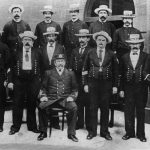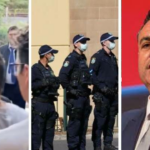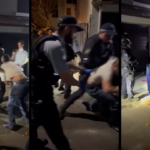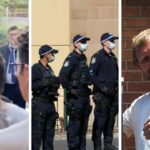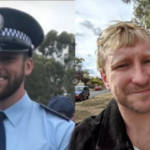Policing the Enemy Within: The AFP Launches National Security Teams to Enhance Social Cohesion
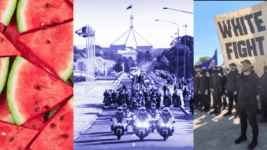
The Australian federal police (AFP) announced on 8 October 2025 that it launched new National Security Investigation teams the previous month “to target groups and individuals causing high levels of harm to Australia’s social cohesion”. These proactive teams are to have an eye to those targeting federal parliamentarians and to “attack” groups and civilians seeking to radicalise others.
The NSI teams have been operating in Sydney, Melbourne and Canberra since September. They’re linked to the AFP’s Counter Terrorism and Special Investigations Command. But given its remit to target threats to social cohesion and the prevalence of concerns around this that top ministers have cited repeatedly of late, the targets of these teams are broader than traditional terrorism offence concerns.
NSI teams have been targeting those “attempting to damage social cohesion” via a “four-pronged strategy”, which consists of “national coordination, policy development, legislation and police operational actions”.
So, these federal law enforcement investigations are not only seeking to police the public for stokers of social discord, but they too plan on influencing and developing new laws.
Social cohesion has been a constant concern of PM Anthony Albanese and his cabinet. It’s too been an issue raised by state and territory ministers, including the premier of NSW. Yet, one of the key concerns of authorities over the last 24 months has been the nonviolent pro-Palestinian antigenocide movement, and such peace activists are not usually a concern of antiterror officers.
With hints of US president Donald Trump’s recent enemy within rhetoric at the United Nations, the federal police set out that these national security-minded teams of officers are going after groups targeting the illusive spectre of social cohesion, and as these groups are known to have international connections to global sewers of social discord, NSI teams have global partners.
The war on social discord
Krissy Barrett was formally made AFP commissioner on Wednesday last week, at the same time as the federal police announced the new NSI teams were already out on the beat and charged with hunting down extremists, who don’t fit neatly into the regular category of terrorist.
“Under my leadership, the AFP will have a laser focus on disrupting crimes that undermine our sovereignty, our democracy, our social cohesion, our financial institutions, our future prosperity,” Barrett told the ABC on 8 October. “We have seen a changing operating environment for us, as law enforcement, as the AFP here in Australia.”
“Another reason I am calling out social cohesion as part of my laser focus,” the top cop continued, “is the importance that social cohesion has to our democracy, to the very fundamentals of being an Australian and feeling safe and secure to live in Australia.”
Barret added that rising politically-motivated violence in Australia over recent years, including threats against federal pollies, has warranted the rollout of NSI teams to investigate and disrupt “high harm activity that threatens our social cohesion”, and these teams will continue to operate in the three city centres they’ve already been deployed to.
“We have had legislation for a little while now related to hate crimes and hate symbols, and the types of offences that I am describing,” Barret further set out. “By setting up dedicated teams… first and foremost, we are calling out clearly to any individuals or groups who are partaking in or driving this type of behaviour, where it gets to a point that it is criminal, they are on notice.”
Defining terrorism in a new era
The commissioner further elaborated that the AFP has traditionally dealt with religiously-motivated violent extremism, which is often called terrorism. The Australian Muslim Advocacy Network (AMAN) produced a report in 2024 that outlined that throughout the local history of prosecuting terrorism only one white Australian has been prosecuted, and the rest have been Muslim defendants.
The shift in the AFP operating environment has occurred partially since the 7 October 2023 Hamas attacks against Israel, Barret outlined. The NSI will target non-religiously-motivated extremist behaviour that doesn’t rate as terrorism but does have “significant national security consequences”, which is activity that can lead to “violent extremism”, she added.
Another issue that the AFP commissioner and the NSI teams are concerned about is whether the laws currently on the books allow officers to conduct investigations into activities threatening social cohesion in a robust manner. So, the federal police is actively looking at what laws it has available to it, and what sort of gaps in the law are hindering their investigations.
Whether “legislation working for us as it stands” is an important concern for the AFP at present, according to its new top cop. So, the federal police is looking at the opportunity that the NSI teams now afford it, not just from an “operating perspective” but from a “strategic perspective”, which suggests the AFP will be directly informing ministers on newly required law reform.
The changing environment
The 24 months since 7 October 2023, have been a tumultuous time, with the main focus being the industrial-scale genocide that Israel has perpetrated in Gaza. This has sparked the changed policing environment that the AFP is talking about. These changes have predominately involved the rise of pro-Palestinian groups, far-right white supremacist activity and to a lesser degree Zionists on parade.
The pro-Palestinian movement is a diverse nonviolent group opposing the genocide against the Palestinians of Gaza. Both state and federal ministers have consistently demonised this group in terms of its street protests as if they were violent demonstrations. Although, this movement has too involved clandestine property damage crimes in aid of Gaza, which has also been on the rise.
Further, far-right white supremacist, and especially neo-Nazi, activity has also been a growing issue over the last two years. This culminated in the March for Australia antiimmigration rallies on 31 August, which involved openly racist rhetoric and in Naarm-Melbourne, it further descended into targeted violence against migrants and an attack on First Peoples.
ASIO director general Mike Burgess also noted, as he and the PM raised the terror threat level to probable in August 2024, that there had been a rise in young people committing terror acts. He also warned that a number of males perpetrating these acts of violence held “mixed ideologies”, which appears to encompass far-right white teens also harbouring some leftist sentiment.
Burgess, as Barret recently did in her interview with the ABC, noted that the new bogeyman in town is rising “politically-motivated violence”, which does encompass terrorism but is “broader than that”, as it also covers “any violent act or any violent threat intended or likely to achieve a political objective”.
Right across the Anglosphere
In terms of the international scope of the new NSI teams, their investigations will be linked to the Five Eyes Law Enforcement Group, which includes the AFP, the Australian Criminal Intelligence Commission (ACIC), US agencies the FBI, the DEA and ICE, the Royal Canadian Mounted Police, New Zealand Police and the UK National Crime Agency and its Counter Terrorism Policing.
The groups being targeted by the AFP are said to “plan their acts and radicalise others online”, so monitoring of these activities will be part of the NSI mandate. The AFP will be applying its unique powers to electronically surveil these groups, and the federal police will be highlighting where laws are not working to maintain social cohesion, including with the 2025 federal hate crime regime.
A moral panic around antisemitism that has served to conflate criticism of Israel with prejudice towards Jewish people has been playing out locally and right across the western world over the past 24 months. This has involved a series of staged property damage crimes in Sydney and Melbourne, which have been revealed to be the work of criminals and some suggested foreign interference.
“While many of these crimes may not meet the threshold of terrorism, the AFP has identified concerning behaviours, which could escalate to politically-motivated violence or hate crimes, which seriously put the Australian community at risk,” said commissioner Barret.
“By collaborating with ASIO and our state and territory police partners, our coordinated disruption activities will be informed by intelligence and targeted at those inciting or preparing to commit violent acts,” the new top cop added in conclusion.



